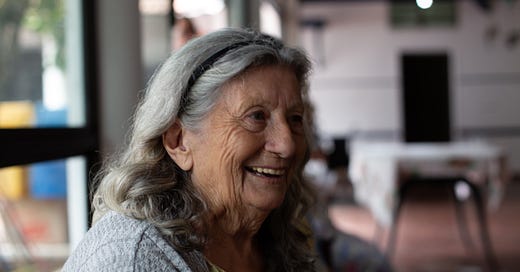The mission of The Sage Forum is to encourage, equip, and empower women over 40 to mature in faith and grow in wisdom. We send out a newsletter at the beginning of each month focusing on a different theme relevant to women in the second half of life. Our October theme will be the spiritual side of menopause. You won’t want to miss it!
The Sage Forum Extra! is a short mid-month reflection meant to offer you a word of encouragement. Today’s Extra! is penned by Sage Forum contributor Carole Duff, who offers a fresh perspective on what it can look like to honor a parent who no longer remembers her child.
Honor your father and your mother, as the Lord your God has commanded you, so that you may live long and that it may go well with you in the land the Lord your God is giving you. —Deuteronomy 5:16 (NIV)
For the last eight years of her life, my mother lived in an assisted care center three hours’ drive away from home, near my older sister. The fact that I was not my mother’s primary caretaker didn’t excuse me from the responsibility of keeping in touch and visiting regularly. But often I wondered if my efforts benefited her. Due to short-term memory loss, Mother didn’t remember our visits. But when I saw the joy on her face whenever I walked into her room and heard delight in her voice over the phone, my thinking shifted from the “I have to” adherence to the letter of the Law to the freedom of the Gospel’s “I get to” honor my mother, especially when her long-term memory began to fail.
“How old am I?” she asked during one of my visits. “What did your father study? Did I do something, too?” Ah, I thought, God has prepared me to do something about this.
Drawing on my years of teaching, I created lesson plans with behavioral objectives and instructional strategies: Mother will be able to view photographs in old albums and tell stories. I pointed to pictures, asked questions, and waited for her responses. And praise God, it worked.
She told me about the Depression and teaching during the war years. “My students and the schoolhouse,” she said, pointing to class pictures taken outside the building. “I taught K-4 in the room to the left, and the other teacher had grades 5-8 in the room on the right. 1943-46.” Then marriage, children, neighborhood picnics and the book club she organized, and going back to teaching—stories she remembered and loved to tell again and again.
“When I told the book club I was going back to work, they hit the roof,” Mother said, her hands leaping into the air as if by their own volition. “Then one-by-one, the women all went back to work. It was the best thing I ever did.” While listening, I realized I wasn’t so much reminding Mother of who she was as she was telling me what was important in life: family, community, work, adjusting to the realities of life changes, especially in the final stage.
Mother moved to skilled nursing for the last three months of her life, and I increased my bi-monthly visits to weekly then twice a week. She died at age 96, remembering deeply rooted memories of family and friends almost to the end—truly a blessing. But if it had been otherwise, I would have visited all the same, not because I had to but because I got to abide with her.
At my mother’s memoir luncheon, a family member said to me, “Your mother wouldn’t have wanted to live that way.” Dementia was not what I had wanted for her either. But, as I observed her living “that way” for eight years, I came to understand that Mother was an important part of God’s plan for this world.
She said, “Hello,” to everyone, even though she couldn’t remember who they were. She attended every activity, even though she couldn’t remember what, when, or where. And she always said, “Thank you,” regardless of who, what, when, or where. The “how” of love. The “how” of community. The “how” of gratitude. Because of the “how,” Mother spread cheer to everyone around her. I got to see these things more clearly about her life as I sought to honor her.
So, I said to the family member, “Thank you, I miss her, too. Actually, Mother lived well in her last years.”
Thank you, Lord, for the gift of family and for creating us in Christ Jesus to do the good works that honor our parents, especially as they age. Amen.
For further reflection: Relationships with aging parents can be complicated and painful for some of us. If you have such a relationship, what ideas and practices have you discovered that have helped you navigate their final years?
Watch your mailbox for next month’s newsletter. And don’t forget to visit our YouTube channel for extended conversation on topics of interest to Sage women.





I pray that as I age, I grow more loving and with the ability to express that love to those that God surrounds me with. Thank you Lord, that you communicate with us and reveal yourself in so many ways.
This one really hit home for me, as Mom has dementia (2,000 miles away) and my MIL has Alzheimer's (close by). I'm only 45, but I have already felt a decrease in my mental accuity, so I'm scared that I will also lose my memory. My MIL especially prayed that she wouldn't get Alzheimer's like her mother, but she still did. This gives me hope that even though who she is has been replaced, God can still use her. And me, if I ever get to that point. Thank you so much! <3